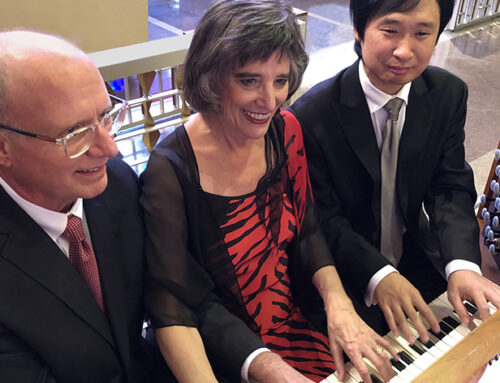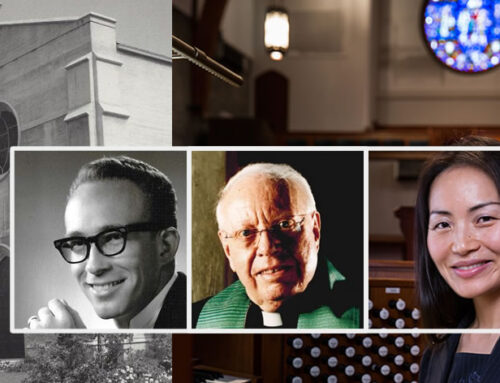I have long been attracted to the theology and poetry of “Mary’s Song,” with the rich imagery of Mary’s mystical experience and her profound response to God’s call. When composing Magnificat, “Coventry” in 2008, I set out to create music that evokes the historical vision of Mary and makes God’s call tangible for us today.
The piece is scored for cello (serving as an iconic voice of God, the Ground of Being), mezzo soprano (Mary) and a cappella choir. The text is adapted from Luke 1:46-55, using several translations and second-person pronouns, which make the encounter more immediate and personal.
and my spirit hath rejoiced in God my savior.[/blockquote2]
Beginning with a low undergirding pitch in the cello, the voices of the choir enter slowly and almost imperceptibly, setting a stage of mystery, awakening Mary’s deepest (tentative, at first) response to God’s call to manifest Eternal Love into the world. As her voice becomes stronger and increasingly elated, and interacting with God’s voice of encouragement, the choir becomes more present, surrounding Mary’s voice, bringing us all into the mystical experience.
and from this day forward, all generations will call me blessed.[/blockquote2]
This is a moment of deeply personal reflection upon the mystery, and when Mary has the realization that all generations will call her blessed, God confirms that with the simplicity of assuring repetition.
and holy is your name.
Your mercy reaches from age to age for those who revere you.[/blockquote2]
This is the first moment in which the choir sings text, taking up Mary’s Song. It is an expression of gratitude to God and acknowledgment of the ineffable mystery of God.
you have scattered the proud in their conceit.
You have deposed the mighty from their thrones,
and raised the lowly to high places.
You have filled the hungry with good things,
and you have sent the rich empty away.[/blockquote2]
The cello leads the choir and Mary in a contrapuntal section, evoking the power and majesty of God’s realm, in which the seemingly powerful have been scattered and deposed, and those who are lowly are lifted up. In God’s realm, the poor and hungry have been filled, while the rich are sent away empty. Earthly values have been turned upside down.
As this section of the piece ends, there is a mournful quality, as the bass section collectively experiences the revelation that their values are intended to be radically changed: sober self-examination.
This leads into a moment of restoration and hope.
(Come to our aid, O God. Remember your mercy.)
You have come to our aid, O God, mindful of your mercy,
from age to age.[/blockquote2]
The choir with Mary sings the affirmation of God’s steadfast promise to be with us. I inserted the parenthetical text as an expression of supplication (in other words, “We really need your help now, God. Please don’t forget.”) before re-affirming God’s faithfulness in every age.
Every age. The Magnificat is not just for Mary, but for all of us. So we hear Mary’s repetition of her soul’s exaltation, in dialog with God.
Then beginning with the lowest voices of the choir — now in eight-part harmony — each voice adds to the magnification of God’s vision, here and now, culminating in Mary’s final ecstatic word of encouragement to us, “Magnify!” The cello adds the last tone of the piece, the original deep tone from which we started, now in full undergirding, and the choir crescendos to fully jubilant magnification of God.
I’m so deeply grateful to Coventry Choir, soloist Serena Eichhorn and cellist Kyle Champion for bringing Magnificat, “Coventry” to such glorious life at Lessons and Carols this December. I hope you find this setting meaningful.



Leave A Comment